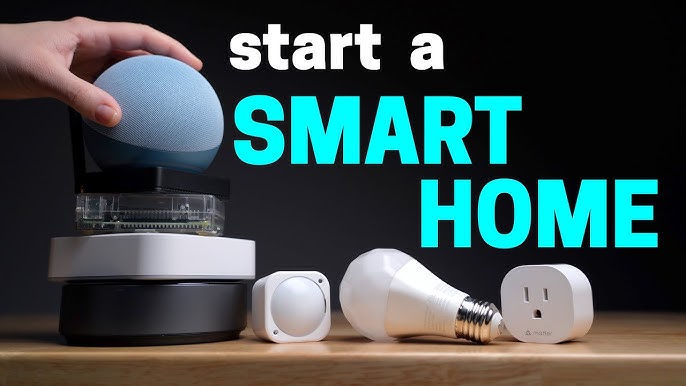Smart Home Automation Devices: The Ultimate Guide to Making Your Home Smarter in 2025
Estimated reading time: 7 minutes
Key Takeaways
- Smart home devices are transforming modern living with enhanced convenience, security, and efficiency.
- Voice assistants like Amazon Alexa, Google Assistant, and Apple HomePod mini serve as central hubs for smart homes.
- Smart lighting solutions offer customizable and energy-efficient options.
- Advanced smart home security systems provide real-time monitoring and remote access.
- Energy management devices contribute to sustainability and cost savings.
- Key trends for 2025 include sustainability, AI personalization, advanced security, and interconnectivity.
- Essential smart home devices for 2025 include smart speakers, intelligent lighting, smart thermostats, security cameras, smart plugs, and automated locks.
- Smart homes offer benefits like unprecedented convenience, enhanced energy efficiency, improved security, and personalized experiences.
Table of contents
- The Smart Home Revolution: An Overview
- Smart Speakers & Voice Assistants: Your Home's Command Center
- Illuminating Innovation: Smart Lighting Solutions
- Smart Home Security: Peace of Mind at Your Fingertips
- Energy Management: Smart Savings for a Sustainable Future
- The Hub of It All: Smart Home Control Centers
- Entertainment & Smart Appliances: The Future of Home Convenience
- 2025 Trends: What's Next in Smart Home Technology
- Essential Smart Home Devices for 2025
- The Benefits of Going Smart
- Conclusion
- Frequently Asked Questions
The future of home living is here, and it's smarter than ever. Smart home automation devices are revolutionizing how we interact with our living spaces, offering unprecedented levels of convenience, security, and efficiency. From AI-powered voice assistants to intelligent security systems, let's dive into the exciting world of smart home technology and discover how these innovations are transforming everyday life.
The Smart Home Revolution: An Overview
Smart home automation devices have become integral to modern living, leveraging Internet of Things (IoT) technology to enable remote monitoring, control, and automation of various home functions. Whether through smartphones, tablets, or voice commands, these intelligent systems are making homes more responsive and efficient than ever before.
Let's explore the key categories of smart home devices that are shaping the future of residential living:
Smart Speakers & Voice Assistants: Your Home's Command Center
At the heart of many smart homes lies the voice assistant. Popular options like Amazon Alexa, Google Assistant, and Apple HomePod mini serve as central hubs for controlling other smart devices throughout your home. These intelligent assistants are becoming increasingly sophisticated, using advanced AI to:
- Learn user preferences and habits (Intelligent Agents in AI: Transforming Multi Agent Systems for Business Success)
- Offer personalized experiences
- Anticipate needs before you even ask
- Manage daily routines seamlessly
- Control multiple devices with simple voice commands
Illuminating Innovation: Smart Lighting Solutions
Smart lighting has moved far beyond simple remote control of bulbs. Modern systems like Philips Hue and adaptive lighting solutions offer:
- Customizable brightness and color temperature
- Scheduled lighting changes throughout the day
- Energy-efficient operation (Sustainable Automation Solutions for Real Estate: A Comprehensive Guide for 2025)
- Automatic adjustment based on natural light levels
- Integration with other smart home systems
Smart Home Security: Peace of Mind at Your Fingertips
Home security has undergone a dramatic transformation with smart technology. Today's security solutions include:
- Smart cameras with real-time monitoring
- Video doorbells with two-way audio
- Motion sensors with instant alerts
- Smart locks with remote access
- Integrated security systems that work together
These devices not only protect your home but also integrate with other smart systems. For example, your security system can trigger your thermostat to adjust settings when you arm it, leading to additional energy savings.
Energy Management: Smart Savings for a Sustainable Future
One of the most compelling aspects of smart home technology is its potential for energy conservation. Smart energy management systems include:
- AI-powered thermostats that learn your schedule (How to Implement Business Automation with Raena AI: A Comprehensive Guide)
- Integration with renewable energy sources
- Automated water conservation systems
- Leak detection devices
- Energy consumption monitoring and optimization
The Hub of It All: Smart Home Control Centers
Smart home hubs serve as the brain of your automated home, connecting and managing multiple devices through:
- Centralized control interfaces (The Power of Hyperautomation Solutions: Transforming Business Operations in 2024)
- Cross-platform compatibility
- Simplified device management
- Customizable automation routines
- Unified user experiences
Entertainment & Smart Appliances: The Future of Home Convenience
From smart TVs to intelligent kitchen appliances, entertainment and household devices are becoming increasingly connected and automated, offering:
- Remote control capabilities
- AI-powered features
- Predictive maintenance
- Energy-efficient operation
- Seamless integration with other smart devices
2025 Trends: What's Next in Smart Home Technology
The future of smart home automation is focused on several key trends:
Sustainability
- Enhanced energy efficiency
- Better integration with renewable energy
- Advanced water conservation features
- Eco-friendly device options
AI Personalization
- More sophisticated learning algorithms
- Context-aware automation (The Rise of Intelligent Process Automation Solutions: Transforming Business Operations)
- Predictive device behavior
- Customized user experiences
Advanced Security
- Improved threat detection
- Real-time monitoring capabilities
- Preventative alert systems
- Enhanced integration with emergency services
Interconnectivity
- Seamless cross-platform operation
- Enhanced device compatibility
- Unified control systems
- Improved user interfaces
Essential Smart Home Devices for 2025
For those looking to build or upgrade their smart home, these devices are considered must-haves:
- Smart speakers (Amazon Echo, Google Nest Audio, Apple HomePod mini)
- Intelligent lighting systems (Philips Hue, LIFX bulbs)
- Smart thermostats (Nest Learning Thermostat, Ecobee)
- Security cameras and video doorbells (Blink, Ring, Arlo)
- Smart plugs and switches
- Automated door locks and sensors
The Benefits of Going Smart
The advantages of smart home automation are clear:
-
Unprecedented Convenience
- Automated daily routines
- Remote device control
- Simplified home management
-
Enhanced Energy Efficiency
- Reduced utility costs
- Minimized energy waste
- Optimized resource usage
-
Improved Security
- Real-time monitoring
- Instant alert systems
- Remote access control
-
Personal Customization
- AI-driven adaptability (The Evolution of Intelligent Process Automation Solutions: Transforming Business Operations)
- Learning capabilities
- Tailored experiences
Conclusion
Smart home automation devices are more than just convenient gadgets; they're transforming how we live, work, and interact with our homes. As we move through 2025, these technologies continue to evolve, offering increasingly sophisticated solutions for security, sustainability, and comfort. Whether you're just starting your smart home journey or looking to upgrade your existing setup, the future of home automation is bright, connected, and more intelligent than ever.
By embracing these innovations, homeowners can create living spaces that are not only more comfortable and secure but also more efficient and environmentally conscious. The smart home revolution is here, and it's making our lives easier, safer, and more connected with each passing day.
Frequently Asked Questions
What is a smart home automation system?
A smart home automation system integrates various smart devices and appliances, allowing you to control and automate home functions remotely or through voice commands.
How do smart thermostats save energy?
Smart thermostats learn your schedule and preferences to optimize heating and cooling, reducing energy consumption and lowering utility bills.
Are smart home devices secure?
While smart devices can enhance security, it's important to implement strong passwords, keep software updated, and use secure networks to protect against potential vulnerabilities.
Can I integrate different brands of smart devices?
Many smart home devices are designed for interoperability, especially if they support common platforms like Amazon Alexa, Google Assistant, or Apple HomeKit.

